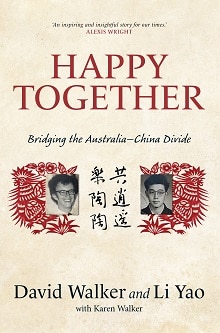 Book review: Happy Together: Bridging the Australia–China Divide by David Walker and Li Yao, with Karen Walker (Melbourne University Press, 2022)
Book review: Happy Together: Bridging the Australia–China Divide by David Walker and Li Yao, with Karen Walker (Melbourne University Press, 2022)
In rural towns in both China and Australia “the chooks and children fly in all directions”. David Walker and Li Yao’s new book Happy Together: Bridging the Australia–China Divide (Melbourne University Press) tells the important and moving story of finding shared experiences in two starkly contrasting histories – whether they be “the chooks and children” or a larger vision for mutual national priorities.
On one level, Happy Together is a tale of friendship between an Australian with a passion for understanding China, and a Chinese man with equivalent passion for understanding Australia. Both were born at the same time in very different contexts and societies and their relationship is based on listening, learning and seeking to better understand each other’s backgrounds.
On another level, the book is a tale of China and Australia’s historical baggage. The interwoven tales of life growing up in Mao’s China with life in conservative South Australia provide pinpoint examples of how the two countries’ national stories interconnect.
No-one has translated more Australian writing into Chinese than Li Yao. He is a central figure in promoting the cultural and historical understanding of Australia in China. Li has translated all manner of Australian classics for a generation of Chinese readers, from Snugglepot and Cuddlepie through to the works of Patrick White, Peter Carey and Alexis Wright.
Li’s co-author, David Walker, is one of Australia’s preeminent historians of China and Australia’s relationship – a humanist with a deep understanding of China’s people, culture and history. From 2013 to 2016, Walker was the inaugural BHP Chair of Australian Studies at Peking University in Beijing. His previous publications include Anxious Nation: Australia and the Rise of Asia 1850–1939 and Stranded Nation: White Australia in the Asian Region, both of which examine the history and role of Australia’s fear and deeply embedded mistrust of geopolitical China.
Walker and Li’s book goes some way to broaching that chasm and carries three key lessons for those seeking to envision the future of Australia–China relations.
The first is that Happy Together challenges readers to seek the histories and experiences they have in common. There are themes running throughout the book that are shared by both Li and Walker’s families. Lives shaped by travel and transformation, ordinary folk caught in the web of history, migration, raising families and making homes through good times and bad. Recognising the commonality of these human journeys provides a useful antithesis to media and policy rhetoric that has the tendency to depersonalise and objectify China and Chinese people and disconnect Australians from the China story.

The second lesson is that the book is a stark reminder of the historical pain, shame and trauma experienced by the Chinese people in recent history. Li’s life in the early years of the People’s Republic of China and the Cultural Revolution were marred by the persecution of his parents under the new regime. His mother was tortured and beaten, and his favourite teacher was shot. Through uncovering his family history from the 19th Century, readers hear about famine, war, the horrors of the Japanese occupation and struggling against the elements to survive daily life. The stories are a lesson in understanding the reality of today’s China as shaped by its traumatic and turbulent past, a lens that helps in understanding patriotism, protectionism and middle-class ambition.
The third is that universities function as a platform for the genuine exchange of culture and understanding. Universities provide the meeting ground, the site for the shared language of academia and a shared purpose. Happy Together highlights universities as an essential playing field for the “doing” of inter-cultural communication and soft power. The concept of “soft power” has the tendency to exist in the ether – in a world of shallow rhetoric and meaningless buzz words. Happy Together is an example of a tangible and ontological product and producer of soft power, facilitated by universities in Australia and China.
The importance of universities features throughout the book. Li worked with Professor Hu Wenzhong, one of the “Gang of Nine” literary scholars from across China who had studied linguistics and Australian literature at the University of Sydney in 1979. And Walker was instrumental in establishing Australian Studies as a discipline in China, building mechanisms for students to learn about Australia. Chinese students in Australia are a part of this long-term soft-power project.
The centrality of universities – of academic exchange, research collaboration and international student mobility – in promoting an understanding of the common experiences between the two cultures, and the profound differences in how Chinese and Westerners see the world is summed up by the authors:
The differing vulnerabilities of Australia and China, their different cultures, mythologies, and patterns of thought make it critically important for the two countries to develop education programs that allow students to study the other and understand why and how they see the world as they do.
Happy Together is a tale of collaboration between China and Australia. At its heart, this is a book about forgetting, forgiving and the memory of pain. It is a book about empathy and understanding and about recognising shared human challenges as a platform for building productive and lasting relations between Australia and China. As Walker and Li say:
Listening is both an act of courtesy and a way of learning. Too often we fail to do this.

